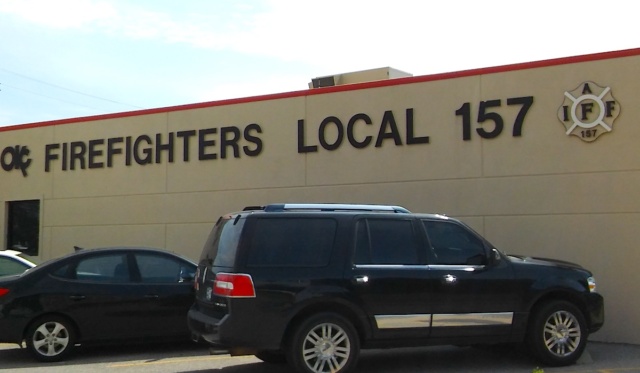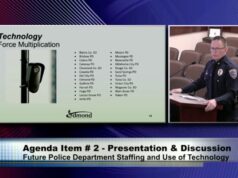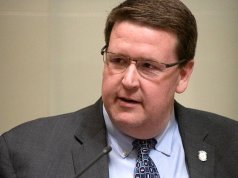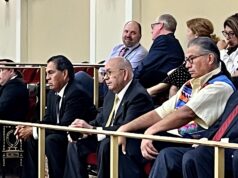
In a move several Capitol insiders have deemed surprising, Gov. Mary Fallin vetoed SB 46 Tuesday afternoon, functionally killing the Oklahoma Public Employees Relations Board that hears unfair labor practice disputes and certifies new unions as bargaining agents.
The bill passed both chambers unanimously and extended the sunset of the PERB to July 1, 2018. Last year, a bill extending the sunset from July 1, 2016 to July 1, 2017, failed legislative deadline, meaning the PERB had been operating only to finish remaining business over the past year in hopes of being given an extended sunset this session.
“Officially, the Public Employees Relations Board ceased to exist last year. But under the sunset laws as we understand them, any board can continue to operate for a year to wrap up any business,” said Chalk Norton, lobbyist for the Professional Firefighters of Oklahoma. “We’d been working with Sen. (Nathan) Dahm (R-Broken Arrow) on this, and he agreed to extend it one year and there could be an interim study to look at issues. We liked that idea because we’ve got some things we’d like to talk about.”
But the board no longer has statutory authority to exist after Fallin’s veto Tuesday. She offered no explanation in her veto announcement, but her communications director, Michael McNutt, offered a statement Wednesday.
Union representatives said they viewed the board as still technically existing and thus eligible for a year’s extension.
“This seemed more like a rubber stamp,” said Debra Wojtek, communications director for the Oklahoma AFL-CIO. “Nobody gave us a heads up about it. It just kind of threw us off guard.”
Wojtek and Norton described the board’s main functions. First, the PERB served to certify any new union as a bargaining agent by holding an official membership election. Second, the PERB heard and dealt with “unfair labor law” disputes between union employees and municipalities or counties.
“Basically it’s the cheapest alternative instead of going to court,” Wojtek said. “With that gone, they could potentially be going to district courts, and that’s going to cost the individual [unions] and the cities.”
Rep. John Paul Jordan (R-Yukon) was SB 46’s House author, and he said the veto “surprised” him.
“I can only speak for myself, but part of the reason why I agreed to run the PERB bill is that I think the board itself is a good mechanism to prevent public employees from suing the state,” said Jordan, an attorney. “It gives them a place for mediation, and from someone who has done litigation, it’s always cheaper to get rid of as many lawsuits as possible before they get filed. That’s what the PER Board was doing — resolving lawsuits before they got filed.”
Since the bill was vetoed at the end of the first session of the 56th Legislature, the Constitution would seem to allow for the House and Senate to attempt an override of the veto during next year’s session, although a 1977 opinion from Attorney General Larry Derryberry argues otherwise.
“I am always willing to look at a veto override,” Dahm said Wednesday afternoon.
Jordan focused on the ramifications of the PERB going away.
“I think it has the potential of costing the state more money by not having this,” Jordan said. “It is a shame because I know that Sen. Dahm was looking into doing an interim study on the PER Board to clarify some of the confusion on it. That’s why the bill itself went down to being just a renewal for a year.”
Dahm said Fallin’s office had called him last week to ask a few questions about the bill.
“There was no indication they had any concerns,” Dahm said. “The reason we decided to do the one-year sunset extension this year was to do that interim study, discuss it and determine what we wanted the long-term extension to be. We’re still going to do an interim study and see what we want to do, especially with the governor’s veto.”
Dahm said termination of the PERB could affect smaller entities with fewer legal resources more adversely than larger unions and cities, something he said could be discussed at the interim study.
“We will be sure to invite the governor’s office so they can learn more about it and become more educated on it,” Dahm said.
‘We’re very disturbed that this happened’
Ron Bartmier, state president of the Oklahoma Fraternal Order of Police, said the FOP is still trying to find out why the bill was vetoed.
“We are highly disappointed there was a veto on this. We’re very disturbed that this happened without having any prior knowledge,” Bartmier said. “We’ve had a very good relationship with the governor’s office, so I’m not really understanding why this wasn’t presented to us before hand.”
While Norton said the Professional Firefighters of Oklahoma have organized most of the state’s fire departments already, Bartmier said some smaller police forces in Oklahoma have been seeking to unionize for the purposes of bargaining.
“We’re bringing in a lot more smaller units now who had not bargained before,” Bartmier said. “We have two or three that were lined up as we speak for certification. Even though they don’t really shut the doors until June 30, [PERB has] stopped performing their functions.”
He agreed with Norton, Wojtek and Jordan that the shuttering of PERB will cost both municipalities and unions more money as labor disputes go to district court instead.
“I certainly think they’ve left us in a situation where it’s going to be more costly for municipalities to deal with certain bargaining issues, particularly if we have to move into district court as opposed to going to PERB,” Bartmier said.
(Update: This post was updated at 4 p.m. Wednesday June 7, to include comment from Sen. Nathan Dahm. It was updated again at 6 p.m. to include an attorney general’s opinion and correct Chalk Norton’s name. NonDoc regrets that error.)
https://nondoc.com/wp-content/uploads/2017/06/SB46-ENR.pdf” height=”450px”]





















